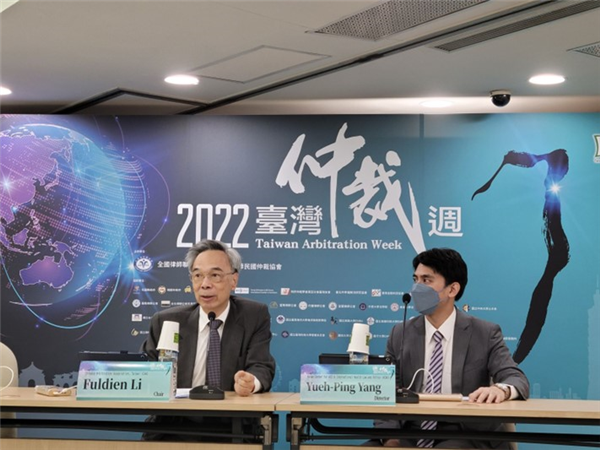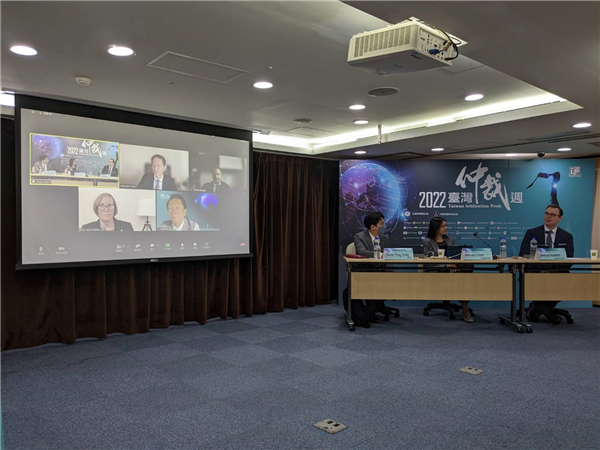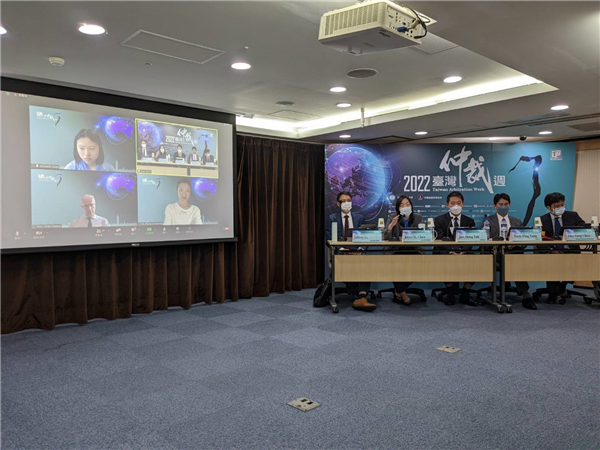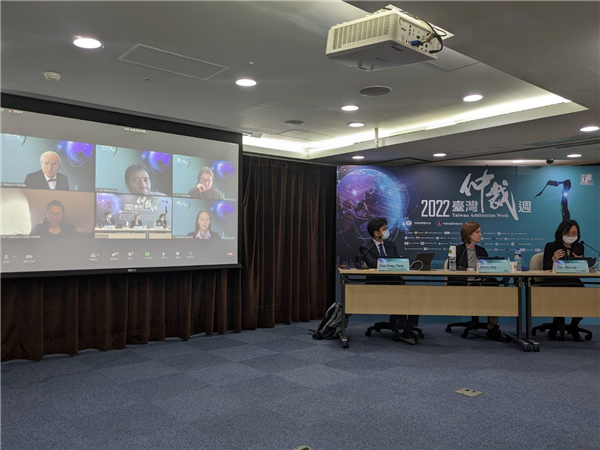回上
一頁
一頁

中華民國111年10月
Oct. 2022
Oct. 2022

10月5日臺北國際仲裁暨調解研討會(疫情/數位經濟/ESG與國際爭端解決)Taipei International Conference on Arbitration and Mediation on October 5 (The Pandemic/Digital Economy/ESG and International Dispute Resolution)
本會與臺灣大學法律學院「亞洲WTO暨國際衛生法與政策研究中心」(WTO中心)合辦的「2022臺北國際仲裁暨調解研討會」,今年首次採線上及實體並行的方式舉行。
This year's Taipei International Conference on Arbitration and Mediation was held in a hybrid form for the first time. The event again was co-hosted by CAA and ACWH (Asian Center for WTO & International Health Law and Policy, National Taiwan University College of Law).

本會李復甸理事長(左)與臺大WTO中心楊岳平教授開幕致詞
Opening address by CAA Chairman Dr. Fuldien Li,, and Director of ACWH Prof Yueh-Ping Yang
第一場次主題為「疫情與國際爭端解決」,邀請到臺大法律系楊岳平教授及協合國際法律事務所吳必然資深顧問擔任主持人,報告人Zachary Sharpe律師、Janet Walker教授、Leng Sun Chan獨立仲裁人、陳希佳博士、Joshua Karton教授,各就學者、律師及仲裁人的角度探討疫情對國際爭端解決所造成的影響。例如,遠距詢問會的增加雖帶來程序經濟及正當程序的權衡問題,但同時也促進了「綠色仲裁」以及仲裁程序「區域化、在地化」的發展。
Session 1 on “The Pandemic & International Dispute Resolution” was co-moderated by Prof. Yueh-Ping Yang, National Taiwan University College of Law, and Dr. Pijan Wu, Senior Counsel of LCS & Partners. The speakers, Mr. Zachary Sharpe, Prof. Janet Walker, Mr. Leng Sun Chan, Dr. Helena Chen and Prof. Joshua Karton, discussed the impact of the pandemic on international dispute resolution from the perspectives of scholars, lawyers and arbitrators. For example, on the one hand, the increase in virtual hearings has raised questions about choosing between procedural economy and due process; on the other hand, virtual hearings also contributed to the development of green arbitration as well as the regionalization and localization of arbitration.

第二場次主題「數位經濟與國際爭端解決」,邀請到理律法律事務所李劍非律師及本會顧問馬若梅博士擔任主持人,報告人Julien Chaisse教授、陳緯人律師、Jun Hong Tan律師、Elizabeth Chan律師、楊岳平教授、陳在方教授,就數位時代加速來臨後,區塊鏈應用、非同質化代幣(Non-fungible token, NFT)、智能合約相關爭議利用仲裁作為爭端解決的優點及其面臨的挑戰,包括是否適用紐約公約的相關規定。此外,本場討論也涉及應建立個資爭議的ADR機制,以因應與日遽增的跨境資訊傳輸需求,確保國際貿易的公平性。
Session 2 on “Digital Economy & International Dispute Resolution” was co-moderated by Mr. Jeffrey Li, Associate Partner of Lee and Li Attorneys at Law, and Dr. Winnie Jo-Mei Ma, CAA Advisor . The speakers, Prof. Julien Chaisse, Ms. Joyce W. Chen, Mr. Jun Hong Tan, Ms. Elizabeth Chan, Prof. Yueh-Ping Yang and Prof. Tsai-Fang Chen discussed the advantages and challenges of using arbitration as the dispute resolution mechanism for blockchain, non-fungible tokens (NFT), and smart contract related disputes, including the applicability of the New York Convention. Additional issues included the establishment of ADR mechanism for data disputes, in response to the increasing demand for cross-border data flows to ensure fairness in international trade.

第三場次主題「環境、社會責任與公司治理(ESG)與國際爭端解決」,邀請到國立陽明交通大學科技法律研究所陳在方所長以及愛丁堡大學法學院Ana María Daza Vargas教授擔任主持人,報告人Stephan Wilske博士、Annemie Heubach、Emily Hay律師、Crina Baltag教授、呂昀儒、羅昌發大使就國際商務及投資仲裁中面臨到的ESG(如氣候變遷、戰爭)課題進行討論,並思考國際仲裁界或仲裁機構是否有能力扮演促進ESG的角色,例如透過仲裁規則減少紙張的使用、避免資助或助長非和平武裝勢力等。
Session 3 on “Environment, Society, and Governance (ESG) & International Dispute Resolution” was co-moderated by Prof. Tsai-Fang Chen, Director of National Yang Ming Chiao Tung University School of Law, and Dr. Ana María Daza Vargas, Lecturer at Edinburgh Law School, Edinburgh University. The speakers, Dr. Stephan Wilske, Ms. Annemie Heubach, Ms. Emily Hay, Prof. Crina Baltag, Ms. Yun-Ru Leu and Prof. Chang-fa Lo discussed selected ESG issues (e.g., climate change and warfare) in international commercial and investment arbitration, and whether the international arbitration community or arbitral institutions have the ability to take on a leading role in promoting ESG. For example, reducing the use of paper through new arbitration rules, and avoiding funding or promoting non-peaceful armed forces.

Session 1 on “The Pandemic & International Dispute Resolution” was co-moderated by Prof. Yueh-Ping Yang, National Taiwan University College of Law, and Dr. Pijan Wu, Senior Counsel of LCS & Partners. The speakers, Mr. Zachary Sharpe, Prof. Janet Walker, Mr. Leng Sun Chan, Dr. Helena Chen and Prof. Joshua Karton, discussed the impact of the pandemic on international dispute resolution from the perspectives of scholars, lawyers and arbitrators. For example, on the one hand, the increase in virtual hearings has raised questions about choosing between procedural economy and due process; on the other hand, virtual hearings also contributed to the development of green arbitration as well as the regionalization and localization of arbitration.

第二場次主題「數位經濟與國際爭端解決」,邀請到理律法律事務所李劍非律師及本會顧問馬若梅博士擔任主持人,報告人Julien Chaisse教授、陳緯人律師、Jun Hong Tan律師、Elizabeth Chan律師、楊岳平教授、陳在方教授,就數位時代加速來臨後,區塊鏈應用、非同質化代幣(Non-fungible token, NFT)、智能合約相關爭議利用仲裁作為爭端解決的優點及其面臨的挑戰,包括是否適用紐約公約的相關規定。此外,本場討論也涉及應建立個資爭議的ADR機制,以因應與日遽增的跨境資訊傳輸需求,確保國際貿易的公平性。
Session 2 on “Digital Economy & International Dispute Resolution” was co-moderated by Mr. Jeffrey Li, Associate Partner of Lee and Li Attorneys at Law, and Dr. Winnie Jo-Mei Ma, CAA Advisor . The speakers, Prof. Julien Chaisse, Ms. Joyce W. Chen, Mr. Jun Hong Tan, Ms. Elizabeth Chan, Prof. Yueh-Ping Yang and Prof. Tsai-Fang Chen discussed the advantages and challenges of using arbitration as the dispute resolution mechanism for blockchain, non-fungible tokens (NFT), and smart contract related disputes, including the applicability of the New York Convention. Additional issues included the establishment of ADR mechanism for data disputes, in response to the increasing demand for cross-border data flows to ensure fairness in international trade.

第三場次主題「環境、社會責任與公司治理(ESG)與國際爭端解決」,邀請到國立陽明交通大學科技法律研究所陳在方所長以及愛丁堡大學法學院Ana María Daza Vargas教授擔任主持人,報告人Stephan Wilske博士、Annemie Heubach、Emily Hay律師、Crina Baltag教授、呂昀儒、羅昌發大使就國際商務及投資仲裁中面臨到的ESG(如氣候變遷、戰爭)課題進行討論,並思考國際仲裁界或仲裁機構是否有能力扮演促進ESG的角色,例如透過仲裁規則減少紙張的使用、避免資助或助長非和平武裝勢力等。
Session 3 on “Environment, Society, and Governance (ESG) & International Dispute Resolution” was co-moderated by Prof. Tsai-Fang Chen, Director of National Yang Ming Chiao Tung University School of Law, and Dr. Ana María Daza Vargas, Lecturer at Edinburgh Law School, Edinburgh University. The speakers, Dr. Stephan Wilske, Ms. Annemie Heubach, Ms. Emily Hay, Prof. Crina Baltag, Ms. Yun-Ru Leu and Prof. Chang-fa Lo discussed selected ESG issues (e.g., climate change and warfare) in international commercial and investment arbitration, and whether the international arbitration community or arbitral institutions have the ability to take on a leading role in promoting ESG. For example, reducing the use of paper through new arbitration rules, and avoiding funding or promoting non-peaceful armed forces.

如您不希望收到本報信息,請點選取消訂閱仲裁報。
If you do not wish to receive this newsletter, please click HERE.